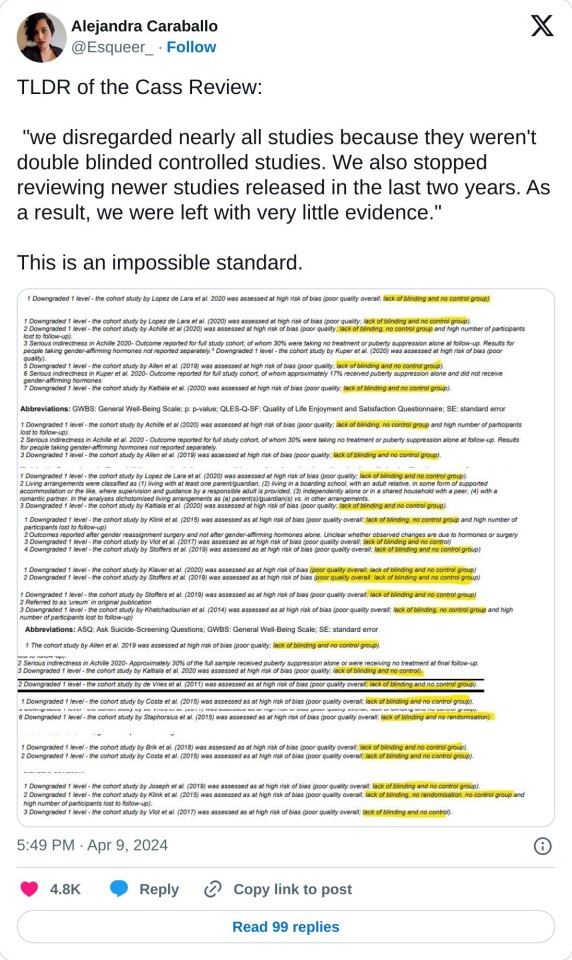#cass review
Explore tagged Tumblr posts
Text
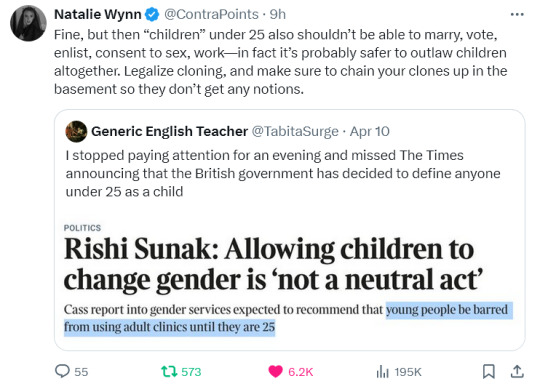
This is what happen when people take the 'your brain doesn't mature till 25' pop-sci too literally and just ran with it, also transphobia
#england#britain#rishi sunak#trans#lgbt#lgbtqia+#natalie wynn#contrapoints#queer#trans rights#cass review#cass report
10K notes
·
View notes
Text
UK petition: An independent evaluation of the Cass review on child gender services
[ Click here to sign ]
We believe that trans healthcare should be based on unbiased research that is peer reviewed. We think that the Cass review's findings have led to restrictive practices that are being directly felt by transgender children. We feel that an independent evaluation is necessary to ensure children aren’t being unduly harmed. We think that only through a transparent process can we guarantee fair access and treatment for trans children as well as restore faith in the current NHS services.
Deadline: 12 June 2025
Graph of signatures: Click here
Who can sign?
Anyone living in the UK (regardless of citizenship)
Any UK citizen (regardless of country of residence)
[ Click here to sign ]
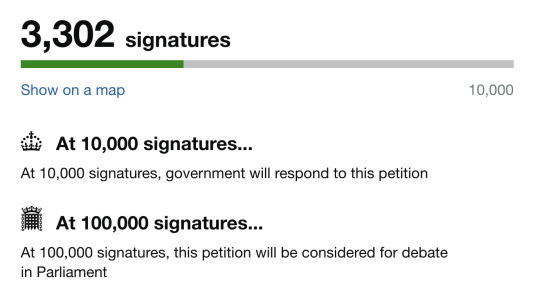
[ Click here to sign ]
#UK#projects#petition#cass review#cass report#trans#transgender#nonbinary#LGBT#LGBTQ#LGBTQIA#queer#MOGAI#non-binary#non binary#trans kids#trans rights#activism#armchair activism
3K notes
·
View notes
Note
Hi Miss Thorn.
I was recently reading through your trans writes article about you choosing not to do PR for the NHS. In one line you mention that the medical system "exaggerates or wholly confabulates" certain medical risks, and I was wondering if you could give more of an explanation or some examples about that stuff. I tried looking it up on my own but I didn't really know what keywords to search for, and I don't want to fall into some weird anti-science conspiracy theory rabbithole (especially at a kind of vulnerable part of my transition where I'm finally giving "doing hormones" more serious thought as a Thing I Would Actually Do rather than an idle fantasy where the results magically "fix" me (or a kind of anxiety where it doesn't do anything of value at all :< )
Thank you regardless for your great videos over the years,
A Very Nervous Enby
Sure! So, I would argue that the Cass Review is a prime example of this phenomenon. It concluded that puberty blockers have caused zero documented cases of harm as long as they've been used in Britain, but they might cause some unknown kind of harm in the future, somehow; a harm that hasn't been detected in any of the other countries who have used them, whose evidence - by the way - was discarded.
So we have no evidence of past harm, no idea what a future mystery harm might be, when it might happen, the mechanism for it, or why it would only show up here, now, and not in any of the other countries who have given trans kids blockers previously...
This is clearly making shit up!
And yet the Cass Review was used to justify a ban on blockers.
The only way this makes sense is if by "harm" they mean "being trans." Cass expressed particular concern that most kids who start on blockers go on to medically transition, which - yeah duh? But whereas a normal person views this as a neutral fact about the world, transphobes see it as bad - they see being trans as a bad or dangerous thing to be - and so they want to make people "avoid it" as much as possible.
This is what I mean when I say pathologization exaggerates or in some cases outright fabricates risks of medical transition to justify restricting our bodily autonomy under the guise of "care."
#cass review#trans#this is of course consistent with the fact that medical transition does involve some actual risks
794 notes
·
View notes
Text
My favourite part of the Cass Report is where she goes: “Florence Ashley and others have shown that gatekeeping doesn’t work and should be abandoned. We disagree, not based on any evidence but because it’s incompatible with the way we’ve already decided we wanted to do things.”
#transgender#lgbtq#trans#queer#lgbtqia#lesbian#gay#lgbt#books#trans lit#cass review#cass report#gender affirming care#gender affirming healthcare#trans healthcare
2K notes
·
View notes
Text
Hello, friends. It is once again time to try and bully the UK government into doing science properly.
The Cass Review, written by known transphobe Hilary Cass, was a report on UK trans healthcare, which is ultimately being used to deny services to trans people through the NHS. This includes the withdrawal of prescriptions from people who've been on them for years, have gender recognition certificates, and/or have fully medically transitioned (making it very dangerous to stop HRT), and also prevents people from starting hormones to begin with.
Maybe the most well known thing recently is the ban of puberty-blocking drugs from trans children and teens, under "safety concerns", despite them being allowed for non-trans children with precocious puberty or other conditions. This is even though the Cass Review itself actually kind of states that they work and applied suitably, but then draws a weirdly different conclusions from it.
The whole methodology of the Review is hugely suspect, with sources excluded due to a lack of double blinding, something hugely inappropriate for any studies of this kinda, and ultimately just ignoring the research it's referring to to reach a foregone conclusion. Classic UK government tbh.
Tl;dr: plz sign this and get some actual science applied to trans healthcare in the UK.
If you're not eligible to sign the petition (e.g. not a UK resident/UK citizen) then plz share but don't try to sign it - they've previously rejected petitions for too many international "suspect" votes.
314 notes
·
View notes
Text



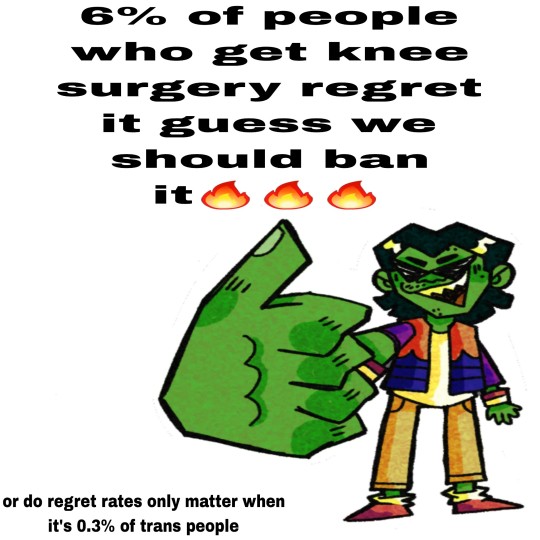

Yeah so fuck the cass report
#cass report#cass review#transgender#trans in the uk#UK#trans ftm#trans mtf#trans teen#ppg#ace copular#ace ppg#gangreen gang#gangreen gang ppg
1K notes
·
View notes
Text
By: Jesse Singal
Published: Jun 27, 2024
In April Hilary Cass, a British paediatrician, published her review of gender-identity services for children and young people, commissioned by NHS England. It cast doubt on the evidence base for youth gender medicine. This prompted the World Professional Association for Transgender Health (WPATH), the leading professional organisation for the doctors and practitioners who provide services to trans people, to release a blistering rejoinder. WPATH said that its own guidelines were sturdier, in part because they were “based on far more systematic reviews”.
Systematic reviews should evaluate the evidence for a given medical question in a careful, rigorous manner. Such efforts are particularly important at the moment, given the feverish state of the American debate on youth gender medicine, which is soon to culminate in a Supreme Court case challenging a ban in Tennessee. The case turns, in part, on questions of evidence and expert authority.
Court documents recently released as part of the discovery process in a case involving youth gender medicine in Alabama reveal that WPATH's claim was built on shaky foundations. The documents show that the organisation’s leaders interfered with the production of systematic reviews that it had commissioned from the Johns Hopkins University Evidence-Based Practice Centre (EPC) in 2018.
From early on in the contract negotiations, WPATH expressed a desire to control the results of the Hopkins team’s work. In December 2017, for example, Donna Kelly, an executive director at PATH, told Karen Robinson, the EPC's director, that the WPATH board felt the EPC researchers “cannot publish their findings independently”. A couple of weeks later, Ms Kelly emphasised that, “the [WPATH] board wants it to be clear that the data cannot be used without WPATH approval”.
Ms Robinson saw this as an attempt to exert undue influence over what was supposed to be an independent process. John Ioannidis of Stanford University, who co-authored guidelines for systematic reviews, says that if sponsors interfere or are allowed to veto results, this can lead to either biased summaries or suppression of unfavourable evidence. Ms Robinson sought to avoid such an outcome. “In general, my understanding is that the university will not sign off on a contract that allows a sponsor to stop an academic publication,” she wrote to Ms Kelly.
Months later, with the issue still apparently unresolved, Ms Robinson adopted a sterner tone. She noted in an email in March 2018 that, “Hopkins as an academic institution, and I as a faculty member therein, will not sign something that limits academic freedom in this manner,” nor “language that goes against current standards in systematic reviews and in guideline development”.
Not to reason XY
Eventually WPATH relented, and in May 2018 Ms Robinson signed a contract granting WPATH power to review and offer feedback on her team’s work, but not to meddle in any substantive way. After WPATH leaders saw two manuscripts submitted for review in July 2020, however, the parties’ disagreements flared up again. In August the WPATH executive committee wrote to Ms Robinson that WPATH had “many concerns” about these papers, and that it was implementing a new policy in which WPATH would have authority to influence the EPC team’s output—including the power to nip papers in the bud on the basis of their conclusions.
Ms Robinson protested that the new policy did not reflect the contract she had signed and violated basic principles of unfettered scientific inquiry she had emphasised repeatedly in her dealings with WPATH. The Hopkins team published only one paper after WPATH implemented its new policy: a 2021 meta-analysis on the effects of hormone therapy on transgender people. Among the recently released court documents is a WPATH checklist confirming that an individual from WPATH was involved “in the design, drafting of the article and final approval of [that] article”. (The article itself explicitly claims the opposite.) Now, more than six years after signing the agreement, the EPC team does not appear to have published anything else, despite having provided WPATH with the material for six systematic reviews, according to the documents.
No one at WPATH or Johns Hopkins has responded to multiple inquiries, so there are still gaps in this timeline. But an email in October 2020 from WPATH figures, including its incoming president at the time, Walter Bouman, to the working group on guidelines, made clear what sort of science WPATH did (and did not) want published. Research must be “thoroughly scrutinised and reviewed to ensure that publication does not negatively affect the provision of transgender health care in the broadest sense,” it stated. Mr Bouman and one other coauthor of that email have been named to a World Health Organisation advisory board tasked with developing best practices for transgender medicine.
Another document recently unsealed shows that Rachel Levine, a transwoman who is assistant secretary for health, succeeded in pressing WPATH to remove minimum ages for the treatment of children from its 2022 standards of care. Dr Levine’s office has not commented. Questions remain unanswered, but none of this helps WPATH’s claim to be an organisation that bases its recommendations on science.
[ Via: https://archive.today/wJCI7 ]
--










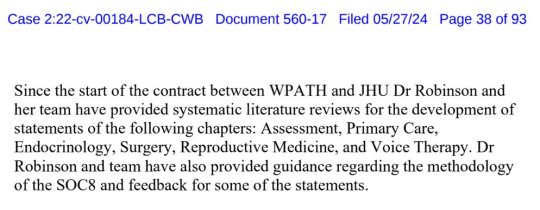


==
So, there are 6 completed reviews sitting somewhere, that WPATH knows shows undesirable (to them) results. And they know it. And despite - or perhaps, because of - that, they wrote the insane SOC8 anyway. And then, at the behest of Rachel Levine, went back and took out the age limits, making it even more insane.
This isn't how science works, it's how a cult works.
When John Templeton Foundation commissioned a study on the efficacy of intercessory prayer, a study which unsurprisingly found that it's completely ineffective, it was forced to publish the negative results.
So, even the religious are more ethical than gender ideologues when it comes to science. This is outright scientific corruption.
#Jesse Singal#Johns Hopkins#Johns Hopkins University#WPATH#World Professional Association for Transgender Health#anti science#gender cult#corruption#medical malpractice#medical corruption#medical scandal#systematic review#Cass review#Cass report#gender affirming care#gender affirming healthcare#gender affirmation#ideological corruption#religion is a mental illness
275 notes
·
View notes
Text
UK petition: Sandyford Clinic [Scotland] to immediately continue to prescribe trans kids hormone blockers
[ Sign here ]
Following the Cass Review, trans kids are no longer able to receive puberty blocker prescriptions from Sandyford, Scotland's only gender identity clinic for under 18s. This is devastating news for trans kids who will now see their bodies change in ways that will trigger dysphoria. It will ultimately cost lives as trans kids are driven to suicide. All this will happen because of some despicable, manufactured "trans debate", where trans kids, and adults, are being used as a scapegoat for society's problems. Trans charities and advocate groups are condemning the awful Cass Review all over the country. The only groups celebrating this dreadful document are anti-trans ones. Hormone blockers have been used for decades safely, and the vast majority of trans kids that go on to transition are happy. A common argument against blockers is that trans kids are not old enough to make such decisions. This is exactly what puberty blockers are for; to hit the pause button on any irreversible changes; to give trans kids time to make these decisions. We urge Sandyford clinic to immediately resume providing trans kids with their life-saving puberty blockers.
[ Sign here ]
#petition#UK#projects#cass review#cass report#armchair activism#puberty blockers#sandyford clinic#scotland#trans
600 notes
·
View notes
Text
Um, holy shit?

From this critique of the Cass Review by NHS clinicians.
#lgbtq#queer#lgbtqia#transgender#trans#lesbian#lgbt#gay#cass review#cass report#trans health#gender affirming care#gender affirming healthcare
1K notes
·
View notes
Text
The methodology for the Cass review was established by a team from the University of York including Tilly Langdon, who has previously been involved in promoting Gender Exploratory Therapy – an approach which, despite its neutral-sounding name, discourages children from identifying as trans and has been likened to conversion therapy. Her approach included setting a very high bar for evidence to be considered in the review, ruling out 100 of the existing 103 studies into the use of puberty blockers and hormones to treat trans children. The reason given for excluding all these studies was that they did not incorporate a double blind approach – in other words, they did not involve giving puberty blockers to some patients and placebos to others. This might sound like a reasonable objection on the face of it – until one considers that puberty is a dramatic physical and psychological process, and people can easily tell when it’s happening to them, so a double blind simply wouldn’t work in practice. The Cass review called for more research and, again, few would disagree with this. The suggestion that treatment should be withheld in the process, however, is not neutral. It presupposes that the harm done by puberty blockers (demineralisation of bones, which is usually temporary in the short-term treatment recommended and is similar to what occurs in pregnancy) is more severe than the harm done to a trans child by going through the wrong sort of puberty. The latter is linked to high rates of self-harm and suicidal ideation, together with the need, in many cases, for extensive surgical procedures. Confusingly, the review states that children taking puberty blockers showed “no changes in gender dysphoria or body satisfaction”, which suggests that the author didn’t actually understand what puberty blockers do at all. They don’t make children feel better – they just delay a process that makes them feel worse. This is one of several oddities in a report that lacks internal consistency. It states that there is no established definition of social transition, for instance, and does not offer one, but goes on to talk about it as if there were. It also talks about autistic ‘girls’ identifying as trans in increasing numbers, treating this as mysterious and as cause for concern, despite acknowledging elsewhere that more and more girls are being diagnosed as autistic, so one would expect more diagnoses to be present within any subsection of the young female-assigned population. Perhaps the most worrying of the review’s conclusions – which should concern people far beyond the trans community – is the suggestion that as far as NHS treatment is concerned, trans people should be treated as children until they are 25. The rational for this is that 25 is the age when (on average) the brain stops developing. As any neurologist will tell you, the brain is in fact never static, and within ten years or so of that age, it begins to shrink. Deciding who has the capacity to make decisions based on brain age could have unintended consequences for the likes of Cass (64). That aside, what would setting the age of true adulthood at 25 mean for everybody else? If we couldn’t allow people to consent to medical treatment at 24, should we ask them to risk dying for us? If not, then at a stroke we could lose a quarter of our armed forces. Likewise, we would have to give serious thought to what to do about a third of parents who might not be considered competent to look after their newborn children. And then there are issues like contraception. Right-wingers have long contended, on one pretext or another, that teenage girls shouldn’t have the right to take the pill without their parents’ consent. This is where the review’s suggestion starts to look less like a double standard and more like the thin end of a very nasty wedge.
304 notes
·
View notes
Text
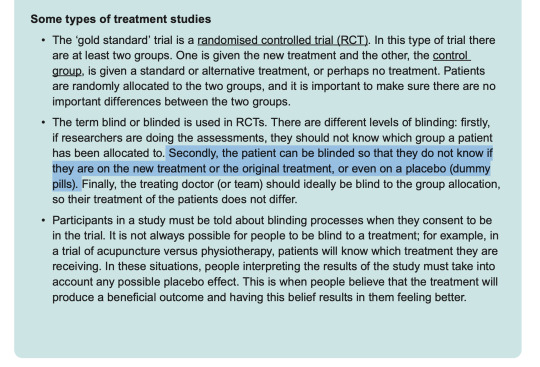
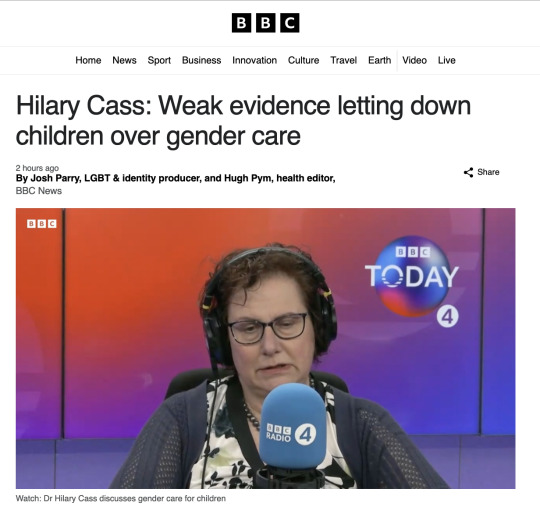
The Cass Review demanded clinicians perform child abuse (placebo HRT and conversion therapy) for acceptable studies on transgender children. As someone studying trans research (who was also a trans kid), I'm disgusted. We must reject all calls for abuse in gender medicine. We have 100+ years showing that HRT works!
If your review cites Lisa Littman & Kenneth Zucker as legitimate sources in 2024, you have no authority to speak about trans issues OR evidence-based medicine. Their studies have been so thoroughly debunked that they're a great example of using weak evidence to draw conclusions.
261 notes
·
View notes
Text
Hilary Cass was a specialist in paediatric disability, so why the fuck anyone thought she was qualified to look at the gender identity service, I don't know. Certainly she has a very poor understanding of the concept of medical consent.
283 notes
·
View notes
Text
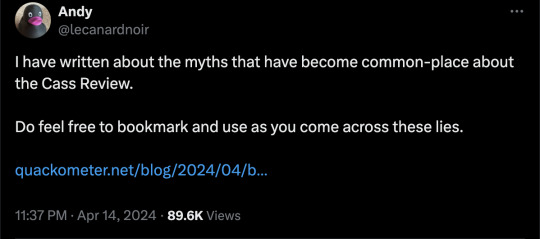
By: Andy L.
Published: Apr 14, 2024
It has now been just little under a week since the publication of the long anticipated NHS independent review of gender identity services for children and young people, the Cass Review.
The review recommends sweeping changes to child services in the NHS, not least the abandonment of what is known as the “affirmation model” and the associated use of puberty blockers and, later, cross-sex hormones. The evidence base could not support the use of such drastic treatments, and this approach was failing to address the complexities of health problems in such children.
Many trans advocacy groups appear to be cautiously welcoming these recommendations. However, there are many who are not and have quickly tried to condemn the review. Within almost hours, “press releases“, tweets and commentaries tried to rubbish the report and included statements that were simply not true. An angry letter from many “academics”, including Andrew Wakefield, has been published. These myths have been subsequently spreading like wildfire.
Here I wish to tackle some of those myths and misrepresentations.
-
Myth 1: 98% of all studies in this area were ignored
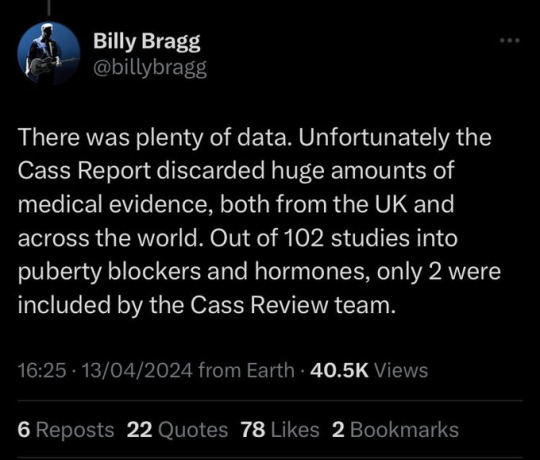
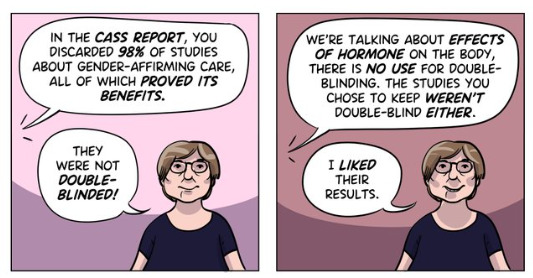
Fact
A comprehensive search was performed for all studies addressing the clinical questions under investigation, and over 100 were discovered. All these studies were evaluated for their quality and risk of bias. Only 2% of the studies met the criteria for the highest quality rating, but all high and medium quality (50%+) studies were further analysed to synthesise overall conclusions.
Explanation
The Cass Review aimed to base its recommendations on the comprehensive body of evidence available. While individual studies may demonstrate positive outcomes for the use of puberty blockers and cross-sex hormones in children, the quality of these studies may vary. Therefore, the review sought to assess not only the findings of each study but also the reliability of those findings.
Studies exhibit variability in quality. Quality impacts the reliability of any conclusions that can be drawn. Some may have small sample sizes, while others may involve cohorts that differ from the target patient population. For instance, if a study primarily involves men in their 30s, their experiences may differ significantly from those of teenage girls, who constitute the a primary patient group of interest. Numerous factors can contribute to poor study quality.
Bias is also a big factor. Many people view claims of a biased study as meaning the researchers had ideological or predetermined goals and so might misrepresent their work. That may be true. But that is not what bias means when we evaluate medical trials.
In this case we are interested in statistical bias. This is where the numbers can mislead us in some way. For example, if your study started with lots of patients but many dropped out then statistical bias may creep in as your drop-outs might be the ones with the worst experiences. Your study patients are not on average like all the possible patients.
If then we want to look at a lot papers to find out if a treatment works, we want to be sure that we pay much more attention to those papers that look like they may have less risk of bias or quality issues. The poor quality papers may have positive results that are due to poor study design or execution and not because the treatment works.
The Cass Review team commissioned researchers at York University to search for all relevant papers on childhood use of puberty blockers and cross-sex hormones for treating “gender dysphoria”. The researchers then graded each paper by established methods to determine quality, and then disregarded all low quality papers to help ensure they did not mislead.
The Review states,
The systematic review on interventions to suppress puberty (Taylor et al: Puberty suppression) provides an update to the NICE review (2020a). It identified 50 studies looking at different aspects of gender-related, psychosocial, physiological and cognitive outcomes of puberty suppression. Quality was assessed on a standardised scale. There was one high quality study, 25 moderate quality studies and 24 low quality studies. The low quality studies were excluded from the synthesis of results.
As can be seen, the conclusions that were based on the synthesis of studies only rejected 24 out of 50 studies – less than half. The myth has arisen that the synthesis only included the one high quality study. That is simply untrue.
There were two such literature reviews: the other was for cross-sex hormones. This study found 19 out of 53 studies were low quality and so were not used in synthesis. Only one study was classed as high quality – the rest medium quality and so were used in the analysis.
12 cohort, 9 cross-sectional and 32 pre–post studies were included (n=53). One cohort study was high-quality. Other studies were moderate (n=33) and low-quality (n=19). Synthesis of high and moderate-quality studies showed consistent evidence demonstrating induction of puberty, although with varying feminising/masculinising effects. There was limited evidence regarding gender dysphoria, body satisfaction, psychosocial and cognitive outcomes, and fertility.
Again, it is myth that 98% of studies were discarded. The truth is that over a hundred studies were read and appraised. About half of them were graded to be of too poor quality to reliably include in a synthesis of all the evidence. if you include low quality evidence, your over-all conclusions can be at risk from results that are very unreliable. As they say – GIGO – Garbage In Garbage Out.
Nonetheless, despite analysing the higher quality studies, there was no clear evidence that emerged that puberty blockers and cross-sex hormones were safe and effective. The BMJ editorial summed this up perfectly,
One emerging criticism of the Cass review is that it set the methodological bar too high for research to be included in its analysis and discarded too many studies on the basis of quality. In fact, the reality is different: studies in gender medicine fall woefully short in terms of methodological rigour; the methodological bar for gender medicine studies was set too low, generating research findings that are therefore hard to interpret. The methodological quality of research matters because a drug efficacy study in humans with an inappropriate or no control group is a potential breach of research ethics. Offering treatments without an adequate understanding of benefits and harms is unethical. All of this matters even more when the treatments are not trivial; puberty blockers and hormone therapies are major, life altering interventions. Yet this inconclusive and unacceptable evidence base was used to inform influential clinical guidelines, such as those of the World Professional Association for Transgender Health (WPATH), which themselves were cascaded into the development of subsequent guidelines internationally.
-
Myth 2: Cass recommended no Trans Healthcare for Under 25s
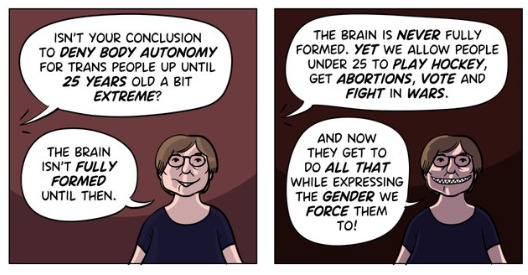
Fact
The Cass Review does not contain any recommendation or suggestion advocating for the withholding of transgender healthcare until the age of 25, nor does it propose a prohibition on individuals transitioning.
Explanation
This myth appears to be a misreading of one of the recommendations.
The Cass Review expressed concerns regarding the necessity for children to transition to adult service provision at the age of 18, a critical phase in their development and potential treatment. Children were deemed particularly vulnerable during this period, facing potential discontinuity of care as they transitioned to other clinics and care providers. Furthermore, the transition made follow-up of patients more challenging.
Cass then says,
Taking account of all the above issues, a follow-through service continuing up to age 25 would remove the need for transition at this vulnerable time and benefit both this younger population and the adult population. This will have the added benefit in the longer-term of also increasing the capacity of adult provision across the country as more gender services are established.
Cass want to set up continuity of service provision by ensure they remain within the same clinical setting and with the same care providers until they are 25. This says nothing about withdrawing any form of treatment that may be appropriate in the adult care pathway. Cass is explicit in saying her report is making no recommendations as to what that care should look like for over 18s.
It looks the myth has arisen from a bizarre misreading of the phrase “remove the need for transition”. Activists appear to think this means that there should be no “gender transition” whereas it is obvious this is referring to “care transition”.
-
Myth 3: Cass is demanding only Double Blind Randomised Controlled Trials be used as evidence in “Trans Healthcare”
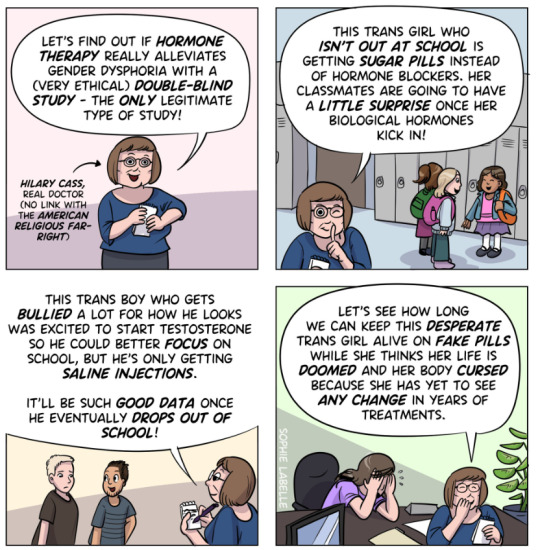
Fact
While it is acknowledged that conducting double-blind randomized controlled trials (DBRCT) for puberty blockers in children would present significant ethical and practical challenges, the Cass Review does not advocate solely for the use of DBRCT trials in making treatment recommendations, nor does it mandate that future trials adhere strictly to such protocols. Rather, the review extensively discusses the necessity for appropriate trial designs that are both ethical and practical, emphasizing the importance of maintaining high methodological quality.
Explanation
Cass goes into great detail explaining the nature of clinical evidence and how that can vary in quality depending on the trial design and how it is implemented and analysed. She sets out why Double Blind Randomised Controlled Trials are the ‘gold standard’ as they minimise the risks of confounding factors misleading you and helping to understand cause and effect, for example. (See Explanatory Box 1 in the Report).
Doctors rely on evidence to guide treatment decisions, which can be discussed with patients to facilitate informed choices considering the known benefits and risks of proposed treatments.
Evidence can range from a doctor’s personal experience to more formal sources. For instance, a doctor may draw on their own extensive experience treating patients, known as ‘Expert Opinion.’ While valuable, this method isn’t foolproof, as historical inaccuracies in medical beliefs have shown.
Consulting other doctors’ experiences, especially if documented in published case reports, can offer additional insight. However, these reports have limitations, such as their inability to establish causality between treatment and outcome. For example, if a patient with a bad back improves after swimming, it’s uncertain whether swimming directly caused the improvement or if the back would have healed naturally.
Further up the hierarchy of clinical evidence are papers that examine cohorts of patients, typically involving multiple case studies with statistical analysis. While offering better evidence, they still have potential biases and limitations.
This illustrates the ‘pyramid of clinical evidence,’ which categorises different types of evidence based on their quality and reliability in informing treatment decisions

The above diagram is published in the Cass Review as part of Explanatory Box 1.
We can see from the report and papers that Cass did not insist that only randomised controlled trials were used to assess the evidence. The York team that conducted the analyses chose a method to asses the quality of studies called the Newcastle Ottawa Scale. This is a method best suited for non RCT trials. Cass has selected an assessment method best suited for the nature of the available evidence rather than taken a dogmatic approach on the need for DBRCTs. The results of this method were discussed about countering Myth 1.
Explainer on the Newcastle Ottawa Scale
The Newcastle-Ottawa Scale (NOS) is a tool designed to assess the quality of non-randomized studies, particularly observational studies such as cohort and case-control studies. It provides a structured method for evaluating the risk of bias in these types of studies and has become widely used in systematic reviews and meta-analyses.
The NOS consists of a set of criteria grouped into three main categories: selection of study groups, comparability of groups, and ascertainment of either the exposure or outcome of interest. Each category contains several items, and each item is scored based on predefined criteria. The total score indicates the overall quality of the study, with higher scores indicating lower risk of bias.
This scale is best applied when conducting systematic reviews or meta-analyses that include non-randomized studies. By using the NOS, researchers can objectively assess the quality of each study included in their review, allowing them to weigh the evidence appropriately and draw more reliable conclusions.
One of the strengths of the NOS is its flexibility and simplicity. It provides a standardized framework for evaluating study quality, yet it can be adapted to different study designs and research questions. Additionally, the NOS emphasizes key methodological aspects that are crucial for reducing bias in observational studies, such as appropriate selection of study participants and controlling for confounding factors.
Another advantage of the NOS is its widespread use and acceptance in the research community. Many systematic reviews and meta-analyses rely on the NOS to assess the quality of included studies, making it easier for researchers to compare and interpret findings across different studies.
As for future studies, Cass makes no demand only DBRCTs are conducted. What is highlighted is at the very least that service providers build a research capacity to fill in the evidence gaps.
The national infrastructure should be put in place to manage data collection and audit and this should be used to drive continuous quality improvement and research in an active learning environment.
-
Myth 4: There were less than 10 detransitioners out of 3499 patients in the Cass study.

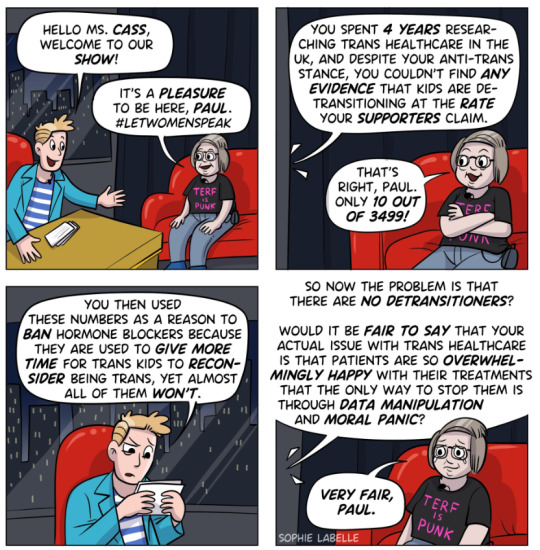
Fact
Cass was unable to determine the detransition rate. Although the GIDS audit study recorded fewer than 10 detransitioners, clinics declined to provide information to the review that would have enabled linking a child’s treatment to their adult outcome. The low recorded rates must be due in part to insufficient data availability.
Explanation
Cass says, “The percentage of people treated with hormones who subsequently detransition remains unknown due to the lack of long-term follow-up studies, although there is suggestion that numbers are increasing.”
The reported number are going to be low for a number of reasons, as Cass describes:
Estimates of the percentage of individuals who embark on a medical pathway and subsequently have regrets or detransition are hard to determine from GDC clinic data alone. There are several reasons for this:
Damningly, Cass describes the attempt by the review to establish “data linkage’ between records at the childhood gender clinics and adult services to look at longer term detransition and the clinics refused to cooperate with the Independent Review. The report notes the “…attempts to improve the evidence base have been thwarted by a lack of cooperation from the adult gender services”.
We know from other analyses of the data on detransitioning that the quality of data is exceptionally poor and the actual rates of detransition and regret are unknown. This is especially worrying when older data, such as reported in WPATH 7, suggest natural rates of decrease in dysphoria without treatment are very high.
Gender dysphoria during childhood does not inevitably continue into adulthood. Rather, in follow-up studies of prepubertal children (mainly boys) who were referred to clinics for assessment of gender dysphoria, the dysphoria persisted into adulthood for only 6–23% of children.
This suggests that active affirmative treatment may be locking in a trans identity into the majority of children who would otherwise desist with trans ideation and live unmedicated lives.
I shall add more myths as they become spread.
==
It's not so much "myths and misconceptions" as deliberate misinformation. Genderists are scrambling to prop up their faith-based beliefs the same way homeopaths do. Both are fraudulent.
#Andy L.#Cass Review#Cass Report#Dr. Hilary Cass#Hilary Cass#misinformation#myths#misconceptions#detrans#detransition#gender affirming healthcare#gender affirming care#gender affirmation#affirmation model#medical corruption#medical malpractice#medical scandal#systematic review#religion is a mental illness
387 notes
·
View notes
Note
I do just want to say thank you for discussing the current transphobia in the UK, especially the Cass Review. I've seen very little discussion on here about it, and quite a bit of that discussion has involved "TERF island" jokes or people just seemingly only using it to joke about how the english are terrible people which um. Bad fucking taste to make those jokes in response to a report that's very much infantizing trans people and wants to stop teenagers and young adults from being allowed to transition at all, including social transition some-fucking-how.
I realised I was nonbinary at the age of 15, applied for transgender health care with the NHS shortly afterwards, and I'm now 21 and only just recently was I seen by them for the first time. I was told it would still be another year at least until I could receive any help transitioning. And now the politicians in this country think I'm "too young" to know my own mind and identity, that I need to wait until I'm 25 to receive any help or support. Will I actually receive that when I become 25? No. They'll keep making transgender healthcare more and more restricted until it's practically banned. The report states that people with depression and autism, like me, are most likely to be transgender, watch them soon say they need to restrict it for those people too "because they're unsure and ill!"
Essentially, what I'm saying is that people need to care about the people in the UK affected by it's rapidly increasing transphobia more than they care about shitting on the country and it's politicians. Yes, we all know it's pretty shit here! Joking about the TERFs in this country does not help your trans siblings there, no more than telling them just to leave the country does!
^^^
#our queer experience#lgbtq#transgender#nonbinary#uk politics#trans rights#cass review#protect trans kids#asks
150 notes
·
View notes
Text
trans kids deserve to grow up trans kids deserve for their healthcare and safety to be protected trans kids deserve to become trans adults trans kids deserve to not be scared of being killed trans kids deserve good mental health trans kids deserve to be able to transition. trans kids deserve to not be looked at as vulnerable sheep who are being whisked into an agenda or a cult rather than just. being authentically who they are.
I realised I was trans aged 11 so I have been a trans kid and now I'm a trans adult and I have been the victim of hate crime as a child, every trans kid I knew had horrible mental health and was actively suicidal and shing or had an Ed or had drug problems. every trans kid I knew as a trans kid felt like they were on a sinking ship and the only people we had was each other. I knew trans kids who didn't make it to adulthood. I knew trans kids who nearly didn't make it to adulthood. I knew trans kids who had absolutely no one.
as a trans adult I'm not saying being a trans adult isn't hard bcs it fucking is but being a trans kid is unbelievably hard. For the entire time I was in secondary school I knew I was trans, I realised I was trans in year 7 and came out to teachers and stuff when I was in year 9. I had a less bad time of it at school than so so many other trans ppl I know but it was still incredibly isolating and scary to be trans at school. I was out as trans for 7 years before I started hormones (aged 18), I wasn't allowed to go on puberty blockers and I was on the waiting list for the nhs for 5 years, I'm still on the waiting list. trans kids deserve adequate and timely medical care. trans kids deserve mental health support and support at school.
as a trans kid I was seen as a vulnerable young person who couldn't do anything or think for myself, as someone who had been manipulated. as a trans adult I am seen as predatory and manipulative even tho only 3 years ago I was the vulnerable person.
trans kids grow up to be trans adults and they deserve that chance. trans adults do not deserve to be seen as predatory.
trans people deserve good medical care, safety, respect, to be able to live
#transgender#transsexual#trans#trans kids#protect trans kids#protect trans lives#protect trans youth#trans kids deserve to grow up#ftm#mtf#trans man#trans woman#nonbinary#transition#transmasc#transfem#theythem#genderfluid#agender#gnc#cass report#cass review
172 notes
·
View notes
